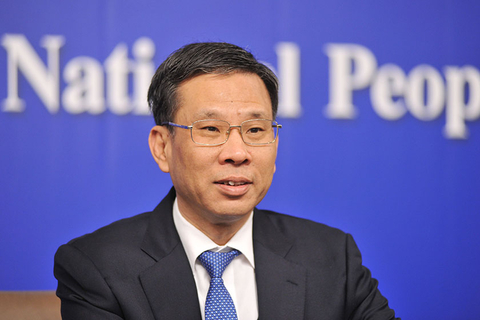Fiscal Reformer Appointed Finance Minister

China has appointed a fiscal reformer to head the Ministry of Finance as the country wages on ongoing war against local government debt, prepares to launch a property tax, and advances an overhaul of spending responsibilities shared between central and regional authorities.
Liu Kun, the 61-year-old chairman of the Budgetary Affairs Commission of the National People’s Congress (NPC), the country’s legislature, was named China’s new finance minister on Monday.
Liu came from humble beginnings. After nearly five years working in a factory in the eastern province of Fujian, Liu took the first college entrance examination after the Cultural Revolution and was admitted to Xiamen University in 1978 to study public finance.
Upon graduation in 1982, he was recruited by the government of South China’s Guangdong province. He spent the next three decades in different official posts in his home province, where new programs for the reform and opening-up were often tried out before being rolled out across the country.
In the seven years after 2002, he honed his reform skills as chief of Guangdong’s Department of Finance, adopting a so-called “competitive allocation of provincial funds for special purposes.” The system, the first of its kind in China’s provinces, employed a performance assessment system in a bid to ensure the efficiency of the distribution of the money. Liu was promoted to vice governor of Guangdong in 2010.
He was moved three years later to the central government to be a finance vice minister. In December 2016, he was transferred to head the NPC’s Budgetary Affairs Commission, which supervises the government budget. Currently, the commission is leading the work to draft the new property tax law.
Liu’s appointment came as China is stepping up efforts to stamp out tricks played by local authorities to evade restrictions to borrow off the budget and improve the supervision on government spending. The goal is to stop credit-fueled investment in infrastructure construction.
Liu’s knowledge of the work of both regional and central finance departments gives him a big advantage in those jobs, said Zhu Chaoping, JP Morgan Asset Management’s global market strategist in Shanghai.
“It seems likely he will focus on improving the local governments’ fiscal discipline. The recent merging of local and central tax departments will streamline this process as it allows the center to have more information and monitor local government,” he told Caixin. “Li Kun knows how local government financing works, which will help him work out mechanisms to control their spending.”
The proposed property tax is “likely to be determined by people at a higher level” than the Finance Ministry, but Liu may still play “some role in technical aspects” of the levy, he added.
Another daunting task Liu faces is deepening the reform to the mechanism for the central and regional governments to share spending responsibilities, which some analysts believe is as significant as the overhaul of the tax revenue distribution system was in 1994.
Contact reporter Fran Wang (fangwang@caixin.com)

- 1Cover Story: China Carves Out a Narrow Path for Offshore Asset Tokenization
- 2Drownings Shake Chinese Enthusiasm for Travel to Russia
- 3Over Half of China’s Provinces Cut Revenue Targets
- 4Li Ka-Shing’s Port Empire Hit by Forced Takeover Amid Panama Legal Dispute
- 5In Depth: China’s Mutual Fund Industry Faces Overhaul After a Banner 2025
- 1Power To The People: Pintec Serves A Booming Consumer Class
- 2Largest hotel group in Europe accepts UnionPay
- 3UnionPay mobile QuickPass debuts in Hong Kong
- 4UnionPay International launches premium catering privilege U Dining Collection
- 5UnionPay International’s U Plan has covered over 1600 stores overseas





